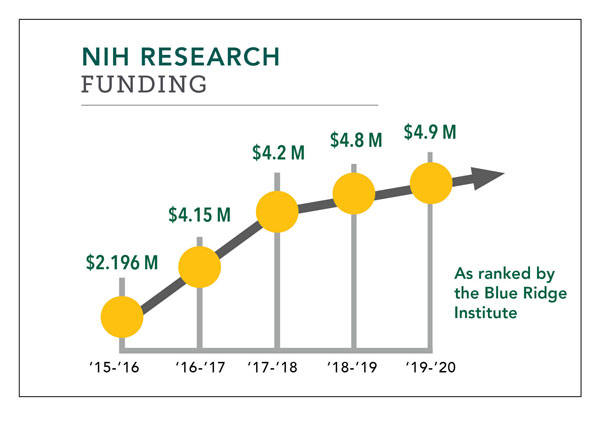 The University of Alabama at Birmingham School of Nursing, an internationally recognized leader in nursing research and scholarship, has again increased its research funding and maintained a spot at the top of the National Institutes of Health (NIH) funding rankings for U.S. Schools of Nursing, as published by the Blue Ridge Institute for Medical Research.
The University of Alabama at Birmingham School of Nursing, an internationally recognized leader in nursing research and scholarship, has again increased its research funding and maintained a spot at the top of the National Institutes of Health (NIH) funding rankings for U.S. Schools of Nursing, as published by the Blue Ridge Institute for Medical Research.
The UAB School of Nursing ranks No. 8 in the nation among public schools of nursing in academic health systems and No. 15 overall with $4.9 million in NIH research funding for fiscal year 2019. In 2018 and 2017, the School received $4.26 million and $4.1 million in funding, respectively. The UAB School of Nursing has an annual total of more than $12 million in current research, clinical, education and training grants.
“The UAB School of Nursing first entered the top 15 in NIH funding rankings in 2017. That year marked a nine-spot jump for our School, and since then, we have maintained our dedication to research and scholarship, continuing to increase our NIH and overall funding,” said Dean and Fay B. Ireland Endowed Chair in Nursing Doreen C. Harper, PhD, RN, FAAN. “In these unprecedented times, we witness the importance of continued research, scholarship and creation of new knowledge, as well as the importance of applying new knowledge in the workforce. I am proud of the role all UAB nurses and nurse scientists have played in receiving grant funding and advancing our profession.”
Funding for fiscal year 2019 includes continued funding for ongoing studies, as well as new and first-time grants.
“Having a balance between new and ongoing NIH funding is an indicator of the momentum that our research faculty have achieved through their hard work and commitment to their programs of research,” said Professor and Associate Dean of Research and Scholarship David Vance, PhD, MGS, MS. “We are fortunate to have an infrastructure and culture within the SON that supports the scholarship pipeline of our faculty.”
The 2019 scholarship grant pipeline included:
Associate Professor Sigrid Ladores, PhD, RN, PNP, CNE received a two-year, $150,000 R03 grant to study fertility preservation counseling for women with cystic fibrosis.
Assistant Professor Chrystal Chapman-Lambert, PhD, CRNP, NP-C, FNP, ACRN, received a one-year K23 grant to study the feasibility of mindfulness-based stress reduction intervention for black women living with HIV.
PhD student Macy Stockdill received an F31 for her PhD studies as well additional learning opportunities.
The School also has two R01s, one led by Vance and the other by Professor and Marie L. O’Koren Endowed Chair Marie Bakitas, DNSc, CRNP, NP-C, AOCN, ACHPN, FAAN. Fiscal year 2019 is the sixth year of continued funding for Bakitas’ project. Vance’s R01 is a five-year, $2.96 million grant that focuses on enhancing cognitive functioning of older HIV patients by examining the dosage level of speed of process training.
Assistant Professors J. Nicholas Dionne-Odom, PhD, MA, RN, ACHPN, and Pariya Wheeler, PhD, also received continued funding for R00 and R21 grants, respectively. Associate Professor Carolyn Pickering, PhD, RN, also received continued funding on an R01 grant for FY2019 and was awarded a second R01 for FY2020. Pickering’s four-year, $1.1 million grant from the National Institute on Aging focuses on Alzheimer’s disease and its impact on family caregivers and has two-and-a-half years remaining. Her $2.87 million R01 grant from the National Institute of Mental Health will look at biological and environmental factors driving behavioral symptoms in Alzheimer’s Disease.
Pickering joined the UAB School of Nursing in January 2020, and funding for her two R01 grants will count toward the School’s FY2020 NIH funding numbers.
“Our current funding is also highly collaborative in nature — not only reflecting scholarly relationships within the school, but also the strong and productive collaborative relationships our faculty have campus wide,” Vance added.
In addition to research support through NIH funding, the School supports work across all of its missions — teaching, research and service — through more than $7 million in grants from sources other than the NIH. This includes the U.S. Department of Health and Human Services, Health Resources and Services Administration (HRSA) education and training grants, as well as other foundation, federal and state grants.
“It is an honor and a thrill to work closely with our faculty of dedicated and innovative scholars. I am humbled by the sheer scope of their expertise and innovative work,” Vance said. “Among the most salient qualities of our faculty is their focus on the future to create a clear path and legacy for future researchers and scholars.”